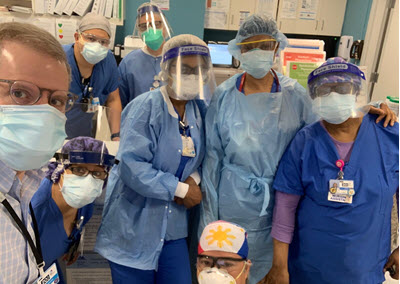

New York City is an epicenter of COVID-19 pandemic in the United States, and the Mount Sinai Health System has spearheaded an array of clinical and organizational innovations to mitigate the crisis. To address the mental health consequences, departments across the Health System collaborated to form a five-tier model of emotional support for all Mount Sinai Health System employees that accounts for the limitations on in-person support in times of social distancing and lock downs. This model is based on the idea that interventions must have a proactive component and should be interconnected and part of a continuum of need. The concept was formulated by Sabina Lim, MD, MPH, Vice President and Chief of Strategy for Behavioral Health for the Mount Sinai Health System, based on recommendations from Craig Katz, MD, Director of Mount Sinai’s Program in Global Mental Health.
The Five Levels
For Level 1 (the most urgent level), immediate mental health crisis response teams (MHCRTs) staffed by more than 50 psychiatrists, psychologists, social workers, counselors, and trainees are assigned to each hospital within the Mount Sinai Health System, connected via a 24/7 call line. They provide assistance for individuals in urgent need of emotional support, and 2) group debriefing and support sessions for units and services in the wake of acute crises (primarily via phone or Zoom).
Level 2 is specifically for front-line health care providers on units and services who are caring for COVID-19 patients—emergency departments, intensive care units, and COVID-19 units. It provides two main sources of proactive emotional support and outreach: 1) “Mental Health Liaisons” for those employees/services directly providing care to COVID patients, and 2) small groups of mental health professionals rounding onsite at all Mount Sinai hospitals several times per week to check in with staff, provide in-person support and encouragement, and provide information about the MHCRTs and Mental Health Liaisons (MHLs).
Level 3 delivers psychosocial support to all employees via Zoom support groups and supportive counseling services. Level 4 contains resources for general guided self-care including Zoom meditation, yoga, and mindfulness activities. Finally, Level 5 focuses on resource navigation—employees can call a central phone line staffed by medical students who can help employees navigate the resources that are available to them. The students are supervised by post-doctoral psychology fellows, who can assist if clinical issues arise.
Mental Health Liaisons
The Mental Health Liaisons (MHLs) program is comprised of more than 100 psychiatrists, psychologists, social workers, and mental health counselors in the Department of Psychiatry and Department of Social Work Services. The teams are assigned to one or more units/services for proactive outreach for employees of all disciplines. They rolled out to 57 units and six emergency departments across the Health System in April. The MHLs serve as the confidential point of contact with individuals via text, email, and phone support Monday-Friday, 9 am-5 pm, as well as regular group debriefing or support sessions. These sessions are primarily virtual, but are also conducted in-person when possible and social distancing is enforced.
“This program is based on the concept of ‘Mental Health PPE’ because we need to be mindful that people need personal protective equipment for their minds as well as their bodies,” said Dr. Lim. Once an employee makes contact with an MHL, the MHLs routinely check in with them again. Support is provided based on principles of psychological first aid, but if an employee is believed to be in need of psychiatric evaluation and/or treatment, the MHL connects them to these services.
The MHL program was expanded in May to include staff in support services, such as environmental services, security, and transport. Various MHL team members have also been assigned to employees who may not be based solely on a unit, such as hospitalists and physician assistants.

Robert Jaffe, MD, Assistant Professor of Psychiatry at the Icahn School of Medicine at Mount Sinai, and Danielle Young, LCSW, Pediatric Intensive Care Unit, and Pediatric ED Social Worker, were the MHL team members assigned to the Hemodialysis and 3 East units at Mount Sinai Queens. “Being able to offer this service to my staff is extraordinary, and paramount to their well-being,” said Anthony Auditore, MNSt, RN, NE-BC, Nurse Manager for the units. “Dr. Jaffe and Danielle have been sensitive to the needs of the staff, flexible to varying situations on the unit, and above all, really allowing the staff to feel that they are not in this alone.”
Ms. Young was immediately struck by the strength and community of the unit. “I have been able to see first-hand how this vicarious trauma plays out, and I want to thank Anthony and his unit for allowing themselves to engage so openly with us during this incredibly challenging time,” she said. “Working as an MHL has been one of the most rewarding experiences I have had as a clinician,” said Dr. Jaffe. “It is an honor to be able to offer groups where staff can safely share their experiences, and we can teach stress reduction strategies.”
“Even just having the iPhone or Zoom meetings, or the deep breathing exercises as a way to take a break and allow time for self-care, really helps us know that we are appreciated and we are all in this fight together,” said Carris Keene, AAS, a registered nurse on Mr. Auditore’s team at Mount Sinai Queens. “Having someone to talk to is truly a game changer.”
